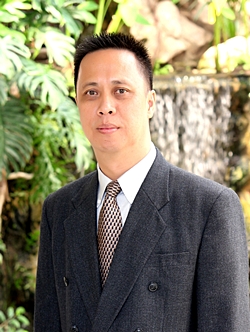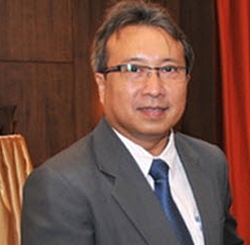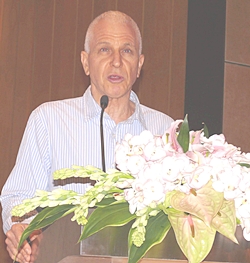|
Dusit Thani Pattaya appoints new resident manager
Chatchawal Supachayanont, general manager of Dusit Thani
Pattaya has announced the appointment of Neoh Kean Boon as the resort’s new
resident manager effective 15 February 2012.

Neoh Kean Boon.
He replaces Aloysius Michael who is now Dusit
International’s corporate director of Rooms Division.
A Malaysian national, Neoh brings with him a wealth of
experience in the hospitality business with a strong background in Food &
Beverage. For over 18 years, he has advanced his career and performance at
the hotels he has worked with including Meritus Pelangi Beach Resort & Spa
in Langkawi, Malaysia.
With his new role, Neoh will be responsible for the
overall operations of the hotel with focus on the F&B aspects.
Supachayanont expressed confidence that Neoh will lead
Dusit Thani Pattaya in creating and implementing ideas as well as sound
strategies to continue its achievements and gain more success.
Thailand’s exports fall 6% in January
Thai exports in January contracted by 6.03 percent
year-on-year with the total value of over US$15.7 billion owing to
Thailand’s 2011 mega-flood and sluggish demand in Thailand’s key markets -
the US, Japan and the European Union, according to the Ministry of Commerce.
Deputy Commerce Minister Poom Sarapol told a news
briefing on Thursday that the falling exports were attributed to the impact
of the country’s floods late last year and the sluggish demand in the
country’s main mature markets which have not yet fully recovered from the
economic crisis.
Exports in agricultural and agro-industrial products
shrank by 4.6 percent - including rice with a 39.8 percent decrease, rubber
with a 20.6 percent drop as well as frozen and processed prawns declining
18.1 percent.
Similarly, industrial goods dropped 13.5 percent,
particularly electronics with a 27.1 percent drop, electrical appliances
with a decrease of 17.5 percent and 12.1 percent decline in automobiles.
Meanwhile, imports in the first month of this year
exceeded $16.8 billion, contracting by 4.2 percent, involving mainly capital
goods and raw materials.
In consequence, Thailand posted a trade deficit of some
$1.1 billion.
Despite the contraction, the commerce ministry projected
that the exports in the coming months would improve, Poom said, adding that
the ministry still keeps its target of this year’s overall export expansion
at 15 percent. (MCOT)
|
|
 |
BoI investment promotions
more than doubled in Jan-Feb
The number of overall investment projects applying for
investment promotions, both Thai and foreign, reached 277 with a total
investment value of Bt154.2 billion in the first two months of this year,
while the investment value edged up by 133.3 percent from Bt66.1 billion
last year, according to Industry Minister Pongsawat Svasti.

Industry Minister Pongsawat
Svasti.
The number of projects surged by 14.5 percent from 242
year-on-year, the minister said, citing Thailand Board of Investment (BoI)
figures.
Businesses for which investors seek promotional
privileges with the highest investment value include chemicals, paper and
plastics with 54 projects valued at Bt64 billion; service and public utility
with 52 projects with an investment value of Bt32 billion; electronic
products and electrical appliances with 57 projects valued at Bt25.6
billion; vehicle-related equipment, machinery and metals with 57 projects
valued at Bt15 billion; and processed agricultural products and foods with
37 projects valued at Bt11.4 billion.
Pongsawat said such investment values reflect Thailand’s
potential and investors’ high confidence on investing in the country.
Meanwhile, Thailand’s Board of Investment (BoI)
Secretary-General Atchaka Sibunruang said such high surge was due to growing
investment direction from abroad.
She said there were 188 projects for which foreign
investors sought promotional privileges during Jan-Feb, with an investment
value of Bt82.2 billion. The number of projects increased 30.5 percent from
144 year-on-year, while their combined investment value edged up 91.7
percent from Bt42.8 billion.
Electronic products and electrical appliances were the
businesses for which foreign investors sought promotional privileges with
the highest investment value at Bt25.5 billion (47 projects).
According to Ms Atchaka, foreign direct investment (FDI)
promotions during the first two months were mainly businesses already
invested in Thailand and wanting to expand their investment, counting for
114 projects with an investment value of Bt55.4 billion.
Japanese investors remain the most active applicants with
an investment value of Bt38.2 billion with 101 projects. American investors
came second in applying for 10 project promotions with an investment value
of Bt8.1 billion, while investors from the Netherlands ranked third, seeking
promotions valued at Bt6.6 billion with five projects.
Singaporean investors sought 14 project promotions valued
at Bt3.2 billion, while Swiss investors applied for 13 projects with an
investment value at Bt2.5 billion with four projects. (MCOT)
|

|
AFG looks at ASEAN and Myanmar
Dr. Iain Corness
The dynamic Automotive Focus Group (AFG) met at the
Hilton Pattaya last week, later joining an informative address by Anthony
Nafte - senior economist at CLSA.

Anthony Nafte.
New president, Uli Kaiser, introduced the new committee
to the members, following the resignation of previous president James
Beeson, who has taken up a senior appointment in Korat. In addition,
secretary/treasurer Maurice Bromley and his wife Renita are returning to the
Philippines, leaving another two vacancies in the executive, filled by Frank
Holzer (VP), Randy Simmons (treasurer) and Armin Walter (secretary). Mention
was also made that the AFG, now a stand-alone organization turns five years
old this year, and a suitable celebration will be organized.
The AFG members were also very interested in the address
given by Anthony Nafte, as since January 1997, Anthony has developed wide
reaching expertise in various Asian economies. He is a specialist on
emerging ASEAN markets, covering Indonesia, Malaysia, the Philippines and
Thailand. He is currently based in Hong Kong and has a BSc in economics from
the University of London and an MSc in economics from the London School of
Economics.
The address was titled, “The Myanmar-Thai Nexus: Blazing
the ASEAN Trail” following on from Myanmar’s recent political opening paving
the way for an economic restructuring that will unleash the country’s huge
potential. This is a nation rich in resources, with extensive arable land, a
young labor force and the lowest wage level in the region. There will be
significant impact that such development will have on the region, through
enhanced connectivity with China, India and Japan and the opening of a new
gateway to Europe. Thailand will be central in broadening the transportation
network across ASEAN, spurred by its increasing reliance on Myanmar’s energy
resources for sustaining its own economic upswing.
The presentation was quite informative - pointing out,
for example, that Myanmar with its 60 million population, is actually the
largest country in the mainland of SE Asia at 676,577 sq. km and 5,858 km of
international borders.
Anthony spoke on the radical transition from a closed to
an open economy, and with labor costs 24 percent of Thailand’s and 50
percent of China’s this will mean that political change is irreversible.
In the ASEAN region, Thailand is most integrated with
Myanmar with already a large number of migrant workers, with close language
and cultural ties.
70 percent of natural gas reserves are coming from
Myanmar and this makes Myanmar an important resource in the ASEAN community.
Anthony highlighted the fact that Myanmar will import
manufactured goods and cars from Thailand and will need skilled workers.
Tourism will increase exponentially where currently there are 500,000
tourists in Myanmar with many going through Thailand, which currently enjoys
19 million tourists.
With all this activity happening across Thailand’s
borders, the AFG members could see the opportunities that exist for business
in Thailand.
Contact can be made with the AFG through the president
email [email protected].
|

|
PM says high consumer product prices resulted from last year’s flood
Prime Minister Yingluck Shinawatra on Saturday said high
consumer product prices were the result of the massive flood last year, and
ordered the Commerce Ministry to speed up expansion of the “Blue Flag”
program to sell inexpensive consumer goods to help low-income earners.

The premier, on her weekly program “Yingluck Government
Meets the People,” said that the flood crisis of last year was the major
factor that caused high prices of consumer products.
She said that consumer goods prices were lower when
compared with the same month last year but the flood had forced many
factories to halt their operations, while many distribution centers could
not deliver the products, eventually causing prices to increase as demand
was much higher than the supply.
However, she expressed confidence that the high prices of
food and consumer products would return to normal by June this year.
Ms Yingluck said she has ordered the Commerce Ministry to
speed up the expansion of the “Blue Flag” program to sell consumer goods at
low prices assisting low-income earners, and expected every community to
have one Blue Flag shop or stall starting this month.
The ministry of commerce and relevant offices would
implement measures to ensure that prices of consumer goods were reasonable,
particularly those of eggs and palm cooking oil, said the premier.
The prime minister said the government believed the rise
of world oil prices would be only short term and would not intervene in
domestic oil prices, but measures would be taken to ease the impact on the
public. (MCOT)
|

|
|

